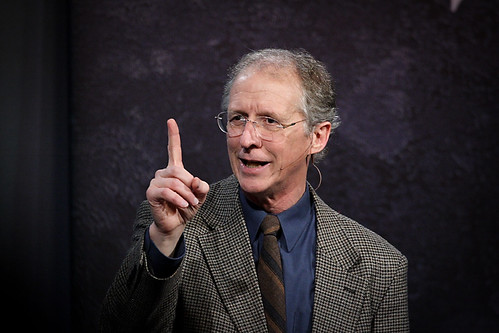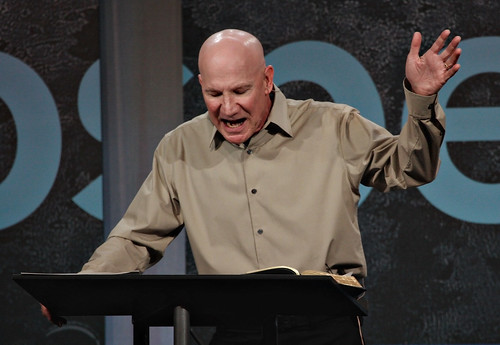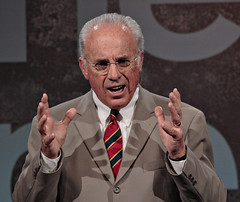
John Piper
How the Supremacy of Christ Creates Radical Christian SacrificeMy recommendation: don't even bother spending the time reading below. Download and listen to the audio here.We must be able to correctly answer these four questions to understand how the supremacy of Christ creates radical Christian sacrifice:
- What is the great reward?
- What is the better resurrection?
- What is the joy set before us?
- What is the city yet to come?
Piper’s answer to these questions is that the answer is found in the book of Hebrews and all of these refer to the supremacy of Christ experienced as the all-satisfying treasure of our lives.
- Hebrews 10:32-35 - a better and abiding possession
- Hebrews 11:6 - a reward for those who seek God
- Hebrews 11:24-26 - Moses looked to the reward
- Hebrews 11:35 - a better life (or resurrection)
- Hebrews 12:2 - the joy set before Christ
- Hebrews 13:12 – therefore, let us go to Christ outside the camp.
May our lives and ministry have a radical, risk-taking, gutsy, counter-cultural, wartime flavor that makes average American people in our churches uncomfortable, that which keeps people off-balance, a saltiness and a brightness about or lives and our churches. Salt and light are joyful embrace of suffering. That’s what the world is waiting for.
Preach and live in such a way that over a decade, or two or three, the church we minister in would produce crazy people who meet death, and cancer and suffering with unflinching joy in Christ in being known and loved by Him.
We must remember the rich, young man. We must not only flee from fornications but ostentations and copulations.
We’ve heard the apostle Paul and have blazed it in our minds and hearts: those who desire to be rich plunge themselves into snares (1 Tiomthy 6:9).
We have eaten the words of Isaiah: all flesh is like grass and all its glory like the flower of grass. The flower falls and the grass withers but the word of the LORD stands forever (Isaiah 40:6-8).
Oh, that our lives and our ministries would have a radical flavor. The world is not going to glorify Christ because they see that Christians are wealthy and healthy and prosperous. There’s a simple reason why: that’s what they live for. We just use Jesus to get it. They use other means. They are not impressed. Jesus is the ticket. When the show starts, we throw the ticket away. They don’t need our ticket. They are not impressed. We should want them to be impressed.
The world may not like it. They may crucify it. Stephen’s face shone like an angel and they could not withstand his wisdom. So they killed him. But they weren’t bored. It cost Stephen his life for Acts 1:8 to be fulfilled.
We must have a flavor about our lives that is risky and radical and different.
- Risk
- Simplicity
- Love
- Joy
- Adventure
- Sacrifice
Where are the pastors who say with the apostle Paul: I don’t count my life of any value nor as precious to myself if only I may finish my course and the work that He gave me to do to testify to the gospel of the grace of God? (Acts 20:24)
Where are the pastors who say with Joab: brothers, be courageous and let us take the cities and may the LORD do what seems good to Him? (2 Samuel 10:12)
Where are the women who say with Esther in the cause of serving her people: if I perish, I perish. (Esther 4:16)
Where are you Joab? Where are you Esther? Where are you Paul?
The world desperately needs to see these kinds of people.
A radical willingness to risk and suffer and sacrifice is the only kind of authentic ministry. Why? Because Jesus said that if we were serious about following, we WILL suffer. A servant is not above his Master.
Paul built his ministry on these truths Jesus taught. Through many trials and tribulations we must enter the kingdom of God (Acts 14:22). All who desire to live a godly life will be persecuted in Christ Jesus (2 Timothy 3:12).
Who shall separate us from the love of Christ? Shall tribulation, death, sword, etc. (Romans 8:35)? Is the reason they won’t separate us because they don’t happen to us, since we are king’s kids? Or is the reason that they won’t separate us because He ordains that these things happen to us but He sustains us and keeps us through them. The next verse tells us the answer: For your sake we are being killed all day long.
But in all these things we are more than conquerors through Him who loved us (Romans 8:37).
If we are left without divine discipline, we are illegitimate children and not sons. Suffering for the following of Christ is the sign that God is our Father. Every kind of suffering. We groan inwardly awaiting the redemption of our bodies (Romans 8:23).
Beloved, Together for the Gospel attendees, do not think it strange when you come into various trials as though something unusual were happening to you (1 Peter 4:12).
We should not want to escape from this. We must embrace this if the world will even consider embracing the Christ who is our Treasure. May we not desire to be carried to the heavens on flowery beds of ease.
So the question is: what creates such a ministry? What creates radical Christian sacrifice? How do we experience this?
The whole book of Hebrews aims at answering this question. The way that the writer creates this impulse is by giving glimpses of the supremacy of Christ throughout the book.
Hebrews is probably the only book that is a sermon delivered to Christians. This book is about creating radical, joyful Christian sacrifice.
The point of all the messages we’ve heard up till now is to make us radically, joyful, sacrificial Christians. The point of hearing all those who slander penal, substitutionary atonement is to make us crazy for Jesus.
Hebrews 10:32-35 – Some believers were put in prison and other believers were faced with the question: what should we do? What created radical, Christian sacrifice was their complete emotional persuasion was that what they were going to inherit in the life to come was so superior that it made whatever loss they were about to experience as nothing.
What creates the radical, crazy lifestyle of risking the plundering of your property for the sake of visiting Christians in jail was the belief that heaven is better. They were free from material possessions. Stuff we own is killing us. These folks had their iPhones thrown away, lost their computers in airline baggage, and they rejoiced. What creates this other worldly impulse is the reward that is coming.
Hebrews 11:24 – How does Moses radical, sacrificial impulse to embrace pain created? He considered the reward. Present sacrifice is sustained by the hope of future reward.
This reward is the supremacy of Christ. The reward is the experience of Christ as our Treasure.
Hebrews 12:2 – How did Jesus bear up in doing radical, crazy, counter-cultural sacrifice? He did it by looking to the reward. He is our model in learning how our motives are to work in the Christian life.
If we haven’t experienced this, we must get on our face and pray for it the way Paul did for the Ephesians that the eyes of their hearts might be enlightened to know the glorious inheritance to which they have been called, the immeasurable greatness of God’s power toward us (Ephesians 1:18, 19).
Hebrews 13:13 – Therefore, let us go to Him outside the camp and bear the reproach that He endured. How? Because we know that here we have no lasting city. It’s all coming down.
It’s all coming down. Don’t live for this. Only what’s done in the love of Jesus will survive that fire.
What does Hebrews 13:13 mean for us? What does it mean for you as an individual to go to Jesus outside the camp? This is the question that we must all answer for ourselves.
May our answer be: I’ll go anywhere.
If we are yielded to this kind of life, God will not leave us without direction.
All these texts work the same way. When we treasure our future reward vastly more than we treasure the comforts and securities of our earthly life, that is how radical Christian sacrifice is created.
But is Hebrews not about Christ’s work as mediator and sacrifice and perfecter of our faith? Are these not just a means to an end? So where do we get the idea that Jesus is the end?
The answer: in doing all this work, Christ displays the majestic, incomparable, beautiful glory of God in all that He does. This is why we will spend eternity singing about horrible things. Slaughter of the Son of God will be our song forever. We will never put the horror of the cross behind us forever. In His means work, Christ becomes the end. The means and the end are not two different things.
So all these pictures in Hebrews of His glory are not just to fit Christ for His means work. They are fitted for that. They are written so that, even more than that, we would see Him as our Treasure in all the glorious work that He does.
Therefore, let us go to him outside the camp. When we really consider who that Him is, we wouldn’t want to be anywhere else. The sweetest fellowship we can have with our Savior is in His sufferings. It doesn’t get any better. And anyone who’s been there knows this.
For here we have no lasting city, we seek the city that is to come, the city whose builder and founder is God, the city whose lamp is the Lamb of God that was slain.







